INTERVIEW: In September 2006, Peter Frampton released his first all-instrumental album, called “Fingerprints.” For the project he was able to bring together not only many of his contemporaries and peers, but also a couple of his long time “heroes” and inspirations, Hank Marvin and Brian Bennett of The Shadows. The album showcases many influences, including the rock beats Frampton is known for along with “quieter” instrumentals with a jazz sensibility, and even blues.
The following is a transcription of a phone interview which took place on Nov. 17, 2006 between rocker Peter Frampton and author/musician Christopher Simmons.
Chris: Well, first off, let me say real quick, that I’m a fan, love the new album (“Fingerprints”), (and) thanks for taking the time today to talk about it.
Pete: You’re welcome. Thank you very much.
Chris: And, thanks for all the music.
Pete: You’re welcome.
Chris: My first question is: You have talked a lot in other interviews about your influences in learning to play the guitar like The Shadows (www.theshadowsofficial.com/). For this album, “Fingerprints” (www.frampton.com), did you have any “I’ve arrived” moment in a musical way while you were in the studio with Marvin and Bennet — or maybe an odd feeling to be working with your heroes. Could you talk a little about that?
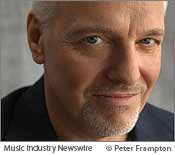 Pete: Well, it was a surreal day in many ways. I’d just flown in from New Zealand the night before. Because Hank had just finished the tour with the Shadows with Brian and Mark, the bass player, and two nights before Hank wanted to… needed to go home and he lives in Australia. So, we should have met somewhere in the middle.
Pete: Well, it was a surreal day in many ways. I’d just flown in from New Zealand the night before. Because Hank had just finished the tour with the Shadows with Brian and Mark, the bass player, and two nights before Hank wanted to… needed to go home and he lives in Australia. So, we should have met somewhere in the middle.
Chris: Right.
Pete: The thing was that, obviously, in London, Mark Knopfler (www.mark-knopfler.co.uk/) lent me his studio which was very nice of him.
Chris: Yeah. Cool.
Pete: And, Hugh Pageant (engineer) came along as well, which was an added bonus. So, it was too perfect not to do it there. So, the whole day was pretty surreal. I think when Hank said “What do you want me to play here?”
Chris: Right. Play whatever you want!
Peter: I said “How about some Hank Marvin?” You know I can’t tell Hank Marvin what to play. He said, “Yes, you can.” He said “I need some input here.” It was wonderful. It couldn’t have been any better. I think not playing well I did end up playing in it. Hank had found out from his tech Lionel, that I’d been talking with Lionel the day before setting up and he knew – he let me touch the guitar – you know, Hank’s guitar. So, Hank said “What’s your favorite number?” Well it has to be “Wonderful Land” which is a ballad with strings, just for its melody and sound. When we finished recording, I noticed that Hank and Brian were – something was happening – and Brian went back out to the drums and Mark went back to the bass and then I said “What are you doing. Did I not get the message or memo? “Oh no,” Hank said, “We’re doing our recording now.” So, he was joking and they were waiting for the machines to roll and then they played “Wonderful Land” for me. And then like half way through the first verse he said “I need a rhythm guitar player.” That was the moment I realized I had come full circle and I connected the dots all the way.
Chris: Great.
Pete: And here I was after hours and hours of learning to play the guitar and play Shadows numbers and here I was playing it with them! You know the only one who wasn’t there was Bruce. It was a pretty spectacular day.
Chris: Do you think there is a chance you will do another project with them or an album?
Pete: Hank has mentioned when he does his next project that he is thinking of doing something along the line of a “jangoesque” gypsy jazz thing himself – an acoustic thing – and he and I have a common interest. So he said “Would you be interested in playing on my record, and I said yes.” Who knows? It took me ten years to get this one together. So, I don’t know how long it’ll take Hank. But it better not take that long because I’m getting on there.
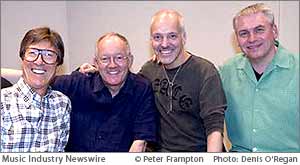
Shadows – Hank Marvin, Brian Bennett, Mark Griffiths. Photo – Denis O’Regan.
Chris: Yeah, I think we all are! Yeah, when you start getting to that age you start looking around and saying, “Let’s see, what haven’t I done yet?”
Pete: Right.
Chris: What do I still want to do that I better get started on?
Pete: Exactly.
Chris: That actually leads me to my next question. What haven’t you done yet that you still want to do creatively?
Pete: Career wise, musically?
Chris: Creatively, whether its painting, or movie sound tracks.
Pete: Yeah.
Chris: Or building a bridge somewhere.
Pete: Yeah, like anything. Well, I think that I would love to do a …. I’ve always wanted to do a film score. But I don’t know if I could work as fast as that. I guess you’re put in a position you do it. It’s a very, very tedious situation, even for the big guys. You know a piece will get rejected by the producer or the director and you got to scramble and get it redone in two hours and, you know, uplink it to this and whatever. And, I don’t know if I could work that way. So, I guess I’m talking myself out of a job.
Chris: (Laughs.)
Pete: But, I’d love to do it because I use to hang with Jan Hammer. We both used to live around the corner from each other in New York while he was working on that Miami Vice thing. So I’d see him do that and work on it. He was phenomenal with that.
Chris: Yeah. He was kind of one of my influences in doing music in the eighties. I had the same Linn9000 drum machine that he had.
Pete: Don’t we all!
Chris: I ended up doing that style of music. That was really popular back then. That’s how I got my first little sound track gig doing a TV cable series in California.
Pete: That’s great!
Chris: I couldn’t make the transition doing film because, of course, like you said, there is a lot of that. It’s almost an art in itself.
Pete: Yeah.
Chris: Quick turnaround and trying to second guess what the directors or producers are seeing in their heads and sometimes that’s very different from what you are seeing in your head.
Pete: I’m not sure that would work well for me. Because it’s like I have vision of something and that’s why I think it would have to be the absolute perfect marriage of director and myself to work on a piece. When you consider I just saw “Flags of Our Fathers” – I don’t know if you have seen that?
Chris: Yes, I have.
Pete: It just blew me away that he did this incredible job again and the music is him “plinking” around on his piano and his sons tape it. I don’t mean… it’s very good, that’s what I’m saying. It turns out that it is very simplistic, but it has passion and it invokes the feeling he wants at that particular time in the movie and it’s almost like you don’t notice it, but you notice it. It really works. It’s very clever.
Chris: Right. He brings out the emotion without overpowering it like a (Jerry) Bruckheimer movie where the music is 50 percent of the experience.
Pete: The way he does it just taps into it a little further, into the emotion of what you are seeing visually, and I think it’s brilliant.
Chris: A lot of people I know forget of course that “Play Misty for Me” – he did that. People forget he did the music.
Pete: Yeah.
Chris: It’s not something he just decided to dabble in.
Pete: No. He has been doing it for a long time. Didn’t he do a blues and jazz documentary or something where he was talking to piano players? (Editor’s Note: this was “Eastwood After Hours,” a jazz documentary of a 1996 concert held at historic Carnegie Hall.) He is really involved in music and has been all is life. So, anyway, that would be a dream situation to work with somebody that you are simpatico with.
Chris. Right, that you’re on the same wavelength with.
Pete: Or, some project that took awhile, but I had some time to build it that way. That would be great. I would love to do that.
Chris: This is kind of an ad industry question because I also run an online advertising magazine. One of the questions we have been bandying around… You definitely have locked into it with this album and a little bit with the last one – with all this alternative marketing. Has this been an interesting process? You are doing a lot of this sort of thing – like hand delivering albums from Amazon.com and doing podcasts.
Pete: Right.
Chris: Kind of like what we’re doing right now.
Pete: Right.
Chris: Who the heck is this guy you’re talking to- you know? How has this process been for you? Anything weird about it, or anything different (from the traditional process of album promotion)?
Pete: Everything is changing in the record industry. It used to be that touring would sell records. It is now the other way around. The few that buy the record, then decide that they will go see the show. Things have changed drastically because people are stealing the music which is the record company’s fault because they didn’t embrace the technology right away. They treated it like the enemy. If they had their head screwed on, we would be in a completely different situation right now. But they didn’t and so it hit them like a ton of bricks. Unfortunately, the by-product of that is that songwriters — they are the ones that get hit the hardest – the ones that don’t perform. People that write songs, hopefully, sell records. The percentage that it’s down in the last 10 years is like incredible. I don’t know what it is, but in the last nine months it went down another 15 percent in record sales.
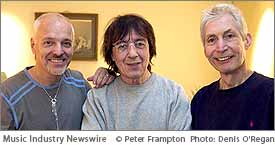
Peter, Bill Wyman, and Charlie Watts. Photo: Denis O’Regan.
Chris: You don’t have the kind of radio air play that there was say 10 years ago, especially, or 20 or 30 years ago where something would get played and played in rotation and the songwriter would be saying “there’s another ten cents and another 10 cents.” You know? You played it three or four times an hour on a high-powered FM station — that sometimes would pay for the house.
Pete: Right. Exactly.
Chris: And now, you know a lot of people don’t even do the radio. They’re doing the subscription stuff.
Pete: Right.
Chris: And you got the online stuff of course, like, the legal version of Napster where you got people paying 10 bucks a month. How much can songwriters be making off of that?
Pete: Unfortunately, it’s diabolical what is happening for people who make a living out of writing music and recording music. But, you know, the cat’s out of the bag and you don’t want to cry over spilled milk — how many more can I use here?
Chris: (Laugh.) Has there been anything that you have run across doing this sort of alternative — the whole buzz marketing thing? Is there anything you have run across that is kind of fun or surprising that you did not expect from this non-traditional stuff. And, I am not talking about your appearance on “Duets.”
Pete: Right. Right.
Chris: Which we are all trying to forget.
Peter: I was worried he was going to body slam me!
Chris: You thought that you were signing up for “Duets,” but it was actually “Celebrity Death Match”.
Pete: That’s right. Yeah. At least they don’t have me on “Come Dancing” or whatever it’s called. I would probably have been so bad that I would have outlived Jerry. So, anyway, I can’t really think about anything fun about marketing.
Chris: You know I do it for a living and so I try to find those little nuggets where you can try to have a little bit of passion somewhere, but there is still that kind of … you are telling your own story over and over again. Well then, as along as it doesn’t hurt too much, I guess that’s a good thing.
Pete: No. You try and do as much as you can. You do have to do more than you did before, but first of all, you are not getting the air play like we talked about. You have to rely on more visible things – like we were on Fox News in the Morning- we got a lot of hits from that. And then, the other night I was on Jimmy Kimmel Live and sat in with the band. That was good. But, he said that the record was called “Fingertips.”
Chris: (Laughs.)
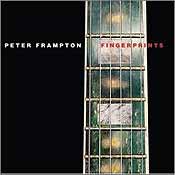 Pete: That wasn’t great, but then he said “Fingerprints” a couple more times afterwards, so that was good. This instrumental record, you know, before you even turn any form of recording equipment on, that you’re potential of sales was diminished in a diminishing business. I didn’t do this expecting to make a lot of money. I did it because I have a passion for the guitar and I haven’t done an instrumental record and I better put my money where my mouth is — finally — and at least make a start. So, I knew that’s what it would be — it is amazing that TV is just not interested — if you know what I’m saying.
Pete: That wasn’t great, but then he said “Fingerprints” a couple more times afterwards, so that was good. This instrumental record, you know, before you even turn any form of recording equipment on, that you’re potential of sales was diminished in a diminishing business. I didn’t do this expecting to make a lot of money. I did it because I have a passion for the guitar and I haven’t done an instrumental record and I better put my money where my mouth is — finally — and at least make a start. So, I knew that’s what it would be — it is amazing that TV is just not interested — if you know what I’m saying.
Chris: Yeah. I was thinking about that the other day. Since I’d seen Beck on Saturday Night Live, which has kind of revitalized itself this year from being a kind of a crap fest for a couple of years now and I was kind of going “Why isn’t Peter Frampton on here?”
Pete: Right.
Chris: You’re right. There isn’t. VH1 is showing wacky TV shows and you have to go off — way off center to find anything like — oddly enough, I think you have been doing a pretty good job with this sort of alternative (stuff) — because of the Web – you know the Internet has become almost like a portal for entertainment now like TV was in the 70s.
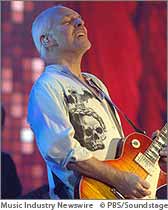 Pete: We did (PBS) Sound Stage (www.pbs.org/wttw/soundstage/ ) — now that was one of the first gigs that we did of the tour with the new five piece band. That is coming out in February, I think, or late January. (Editor’s note: part one aired Jan. 18, and part two airs Jan. 25, 2007.)
Pete: We did (PBS) Sound Stage (www.pbs.org/wttw/soundstage/ ) — now that was one of the first gigs that we did of the tour with the new five piece band. That is coming out in February, I think, or late January. (Editor’s note: part one aired Jan. 18, and part two airs Jan. 25, 2007.)
Chris: Fantastic.
Pete: It’s already on some HD thing — I don’t know how you get it. I think it is on Direct TV or something or one of those DISH networks. You can catch it if you have that certain dish.
Chris: You have to have the right satellite hookup.
Pete: You have to be with the right company. It definitely is on PBS in HD in late January, early February.
Chris: Well, fantastic. Since you have a limited amount of time, let me ask you one more question. What do you consider to be success today? What puts you in a happy place creatively? Is it live concerts, getting feedback from your peers on your new album? Is it the fans’ reaction?
Pete: I think there are two levels. There’s a personal level and a creative level. For my professional level; they are linked creatively. It’s been this record — making it and putting it out there, and playing some of it live and seeing the reason has been liberating for me. I feel that if anyone had doubts about where my passion lies, that should go out the window. If they care to look and find this record. I think this, hopefully, is almost it — the happiest of times — but we know that doesn’t happen all the time. But right now, I am happy because this has done wonders… this record for me as a player, has definitely really pushed me to work hard on this and the playing and everything so — it has been very satisfying to know that the end results were well received as well.
Chris: I think that there is a lot of interest in what you’re doing today even if you’re not in the same consciousness level with Britney Spears and all that kind of malarkey.
Pete: Yeah. Yeah.
Chris: I don’t know if you read the review I had written on one of our web sites. It’s amazing – just that review on our web site has been read something like 160,000 times.
Pete: Wow! Which review did you do?
Chris: I did the one that was on eNewsChannels.com (http://enewschannels.com/2006/10/01/enc247_235732 ) and also the site we’re re-launching, MusicIndustryNewswire.com.
Pete: When did that one go up?
Chris: I think around the 20th or 21st of September (on eNewsChannels).
Pete: OK. I’ve got it. I know I’ve got it.
Chris: One of the things I mentioned is the passion of what you do comes out in this and I think that, not just the fans, but other musicians can pick up on that.
Pete: Oh good.
Chris: I think you’ve pulled it off.
Pete: Well, good. The main thing was I had the most fun making this record mainly because I didn’t have to write any lyrics.
Chris: (Laugh.)
Pete: But no, no, no, it was just great to, well, okay, there’s no vocals here, so how do I make the second verse as interesting as the first verse? You know what I mean?
Chris: Yeah.
Pete: I enjoyed the creative path that it’s put me on. You know it was really, really a lot of fun.
Chris: Do you think that you’ll do another instrumental album or go back to the conventional wisdom or mature vocal type album?
Pete: There will vocals on the next one. But it will be as different as this album was for me. As different as I can make it from any other. I just don’t even want — I got the bug of doing something new or really pushing myself to the limit of expressing some other part of me. Do you know what I mean?
Chris: Right.
Pete: It worked out to actually put me on a limb, where I should always be. I’m not saying that I’ve been lazy before, but I’ve enjoyed going where no Peter has gone before.
Chris: That’s how you learn. It’s the adversity thing. Nobody learns how to change a tire on their car until they have to.
Pete: Exactly. It definitely was an eye opener all around and definitely great for me as an artist. Knowing the feeling I was getting it as I was doing it. I will never forget that feeling. I know I’ve got a benchmark feeling for knowing that I think I’m right here. I think that is really good. I know that feeling can equate with other people as well. Not that I think of other people while I’m doing it, but it’s nice to know that what I like about what I do or can do- other people are picking up on too. You can’t ever feel like “well today I’m going to write a hit song.” It’ll probably be the worst song in history.
Chris: (Laughs.)
Pete: And, it probably won’t be a hit. So, you can’t plan a hit record, you know? I guess there are some people who can, but those are the sort of songs I don’t listen to.
Chris: Exactly.
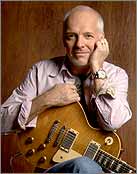 Pete: It’s all about passion. At least, that’s what I feel. Some days I got it, some days, I don’t. It’s great. I love that part too. Some days I don’t feel like I’m getting anywhere and the reward is two days later, you do something that you dreamed about that you could never do. And, that downtime is always a learning time. It’s always preparation time and I realize if I can’t write or can’t get it right, it’s because I am practicing. The practicing I do will make it sound good tomorrow, but not today. I leaned a lot making this record.
Pete: It’s all about passion. At least, that’s what I feel. Some days I got it, some days, I don’t. It’s great. I love that part too. Some days I don’t feel like I’m getting anywhere and the reward is two days later, you do something that you dreamed about that you could never do. And, that downtime is always a learning time. It’s always preparation time and I realize if I can’t write or can’t get it right, it’s because I am practicing. The practicing I do will make it sound good tomorrow, but not today. I leaned a lot making this record.
Chris: Well, great. Is there anything else you would want someone to know about the project that maybe no one has asked you about? Anything you had in the back of your mind? Like, boy, I really wanted people to know this about the album, but I didn’t have the chance to say it.
Pete: Gosh, not really. I think we’ve covered just about everything. I’m giving it a good try but can’t think of anything.
Chris: Well, I know sometimes I’ve interviewed people about stuff and they say “well, no one asked me, but…blah, blah, and blah.” People get in the rut of asking the same sort of questions like “how did you get the idea of using a talk box?”
Pete: Right. Right…
Chris: Or, what’s your favorite song on the album? What kind of clothes do you like?
Pete: Yeah, I know. This has been different.
Chris: Well, I was trying.
Pete: Yeah, it’s been great.
Chris: Trying to come up with something different from the perspective of someone who is into what you do versus the contractual obligation interview you have to do.
Pete: Right. Exactly.
Chris: Well great. I know you have got to get on to doing some other stuff this morning so I really appreciate your taking the time and I will let your team know when we’ve got this up on our website so you can check it out.
Pete: Fantastic, Chris.
Chris: Great talking with you and like I said, I have been a fan since the 70s, obviously. This album was right on. I’m your target audience. I’m into the guitar instrumental albums, so when this album came across my desk, I was like “hey,” how cool is that?”
Chris: Best thing I can possibly say is thanks for all the music, buddy!
Pete: Oh well, thank you.
Chris: It’s been great and can’t wait for the next one.
Pete: Alright, thanks a lot.
More information on Peter Frampton’s music, history, upcoming concerts and appearances, and much more can be found on his website, at: www.frampton.com
Article is Copr. © 2006-2007 by Christopher Simmons – all rights reserved. Story originally appeared on MusicIndustryNewswire.com, and was originally intended for my podcast. Note: images for this interview were sourced from the Frampton.com website, and are the exclusive property of the copyright holder. Image from PBS/Soundstage is the property of PBS. All rights reserved.